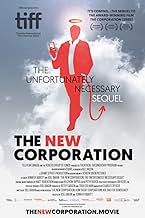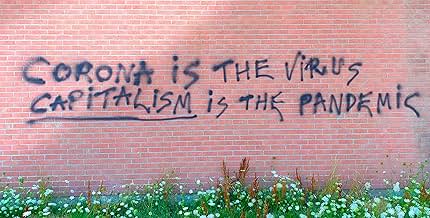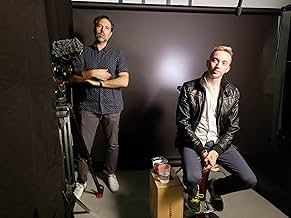Exposes how companies are desperately rebranding as socially responsible - and how that threatens democratic freedoms.Exposes how companies are desperately rebranding as socially responsible - and how that threatens democratic freedoms.Exposes how companies are desperately rebranding as socially responsible - and how that threatens democratic freedoms.
- Awards
- 1 win & 8 nominations total
- Directors
- Writer
- All cast & crew
- Production, box office & more at IMDbPro
Featured reviews
I'm amazed by the number of reviewers who were surprised to find "socialist" or "left-leaning" commentators being interviewed for this documentary--especially those reviewers who mention the original documentary favorably. Since the thesis of the documentary is (essentially) that corporations are dangerous, I'm not sure who else they expected to be interviewed. The film features some of the same interviewees from the first film: Robert Reich, Naomi Klein, Noam Chomsky, Vandana Shiva, and so on. It does also feature a couple corporate representatives, but not the number that were featured in the longer and more in-depth first documentary.
As the film indicates with clips from Margaret Thatcher, Ronald Reagan and Milton Friedman, since the 1970's, a market-based neoliberal philosophy has come to dominate political dialogue to the point that de-regulation is a central mantra of conservatives the world over (not to mention most centrist liberals). I would challenge these reviewers who demand a more "fair and balanced" presentation to scour the internet for a mainstream right-wing politician, thinker or activist that is strongly against corporate consolidation of power. You won't find one. It would be difficult, but not impossible, do do so within the mainstream centrists (Democrats in the US, or liberal parties in other countries), as well.
On the other hand, if the demand is to present these interviews alongside those who speak on behalf of the corporation, we certainly don't need further examples of that: our lives are inundated with constant pro-corporate messages, whether explicitly in advertising, or implicitly in the various privatized systems we have to navigate on an everyday basis--you are reading this review on a website that has been owned by Amazon since 1998. The pro-corporate perspective is also represented in the first film, which is more broadly about the history of corporations and their general methods of operation; this "sequel" feels more like an addendum or appendix than something to be viewed in a vacuum. In other words, if you haven't seen the first film, you should watch that first, as it is certainly still relevant and revealing.
Chris Hedges is correct that it is hard to view the complex of issues presented currently without feeling a deep sense of despair. I think that is why the second half of the film, which I see here derided by others, is both important, and ironically the subject of such angst. We are at an impasse and many of us feel powerless to counteract global forces that seem to be spiraling toward inevitable destruction. To present this documentary without some iota of hope would not only be depressing, it would be irresponsible. In the internet age, where raising someone's ire is the surest way to generate traffic, and therefore revenue, we should take at least some time to focus on the causes that bring us together, not just the ones that piss us all off.
As the film indicates with clips from Margaret Thatcher, Ronald Reagan and Milton Friedman, since the 1970's, a market-based neoliberal philosophy has come to dominate political dialogue to the point that de-regulation is a central mantra of conservatives the world over (not to mention most centrist liberals). I would challenge these reviewers who demand a more "fair and balanced" presentation to scour the internet for a mainstream right-wing politician, thinker or activist that is strongly against corporate consolidation of power. You won't find one. It would be difficult, but not impossible, do do so within the mainstream centrists (Democrats in the US, or liberal parties in other countries), as well.
On the other hand, if the demand is to present these interviews alongside those who speak on behalf of the corporation, we certainly don't need further examples of that: our lives are inundated with constant pro-corporate messages, whether explicitly in advertising, or implicitly in the various privatized systems we have to navigate on an everyday basis--you are reading this review on a website that has been owned by Amazon since 1998. The pro-corporate perspective is also represented in the first film, which is more broadly about the history of corporations and their general methods of operation; this "sequel" feels more like an addendum or appendix than something to be viewed in a vacuum. In other words, if you haven't seen the first film, you should watch that first, as it is certainly still relevant and revealing.
Chris Hedges is correct that it is hard to view the complex of issues presented currently without feeling a deep sense of despair. I think that is why the second half of the film, which I see here derided by others, is both important, and ironically the subject of such angst. We are at an impasse and many of us feel powerless to counteract global forces that seem to be spiraling toward inevitable destruction. To present this documentary without some iota of hope would not only be depressing, it would be irresponsible. In the internet age, where raising someone's ire is the surest way to generate traffic, and therefore revenue, we should take at least some time to focus on the causes that bring us together, not just the ones that piss us all off.
90% of the negative reviewers either didn't watch the movie or came into it with a decidedly anti-socialism (a word that they couldn't define in real world terms) bent and pro-capitalism mindset.
For one thing, the movie is OK. Points out how big banks and corporations have taken to hiding behind the "social justice" messages they've cribbed from whatever actual movement is convenient for them at a given time. They don't pick the best interview subjects (we've all heard Bernie "Sheepdog" Sanders and AOC's (correct) spiels before). They could have sought out people like Howie Hawkins or other less-well-known advocates for *actual* socialism and for reining in the power that these organizations exercise over our government through dark money, lobbying, insider-trading and outright bribery.
Nobody including negative reviewers cares to point out how "crony capitalism" and "corporate capitalism" are any different from each other because they haven't done the homework or read authors like Michael Hudson or seen movies like "The Wobblies" about the IWW. If they had, they'd know what the "Overton Window" is and that it was in fact "radical left-wing socialists" who are responsible for the end of child labor and the 8 hour work day among many other things including the New Deal which - unlike the bailouts of too-big-to-jail banks in 2008 - bailed out the American working class and set up bulwarks against monopolistic, unethical corporate practices. The Republicans starting with Reagan and continuing through Democrats like Clinton systematically tore down as much of that as they could on behalf of their financial/corporate masters (buy bye Glass-Steagall!!! Hello NAFTA!!!) and in the same time period the Overton Window has intentionally been shifted to the right with even Starbucks baristas forming unions portrayed as "radical leftists" trying to bring down capitalism (also, why do people insist on capitalizing that word as though it's a proper noun? I'll tell you - the consistent, constant propaganda paid for by the big banks/corps and unwittingly consumed and absorbed by the would-be working class).
Take away the Overton Window and there's absolutely zero "left-wing" or "radical left" to this film. Anyone who called Obama a leftist should not be trusted to objectively review it. All in all, the Necessary Sequel is a bit of a let-down from the previous movie, but worth watching if you can do so with an open mind (something far too many of my closed-minded "conservative" friends think they have, but really don't, thanks to YouTube influencers and the like).
For one thing, the movie is OK. Points out how big banks and corporations have taken to hiding behind the "social justice" messages they've cribbed from whatever actual movement is convenient for them at a given time. They don't pick the best interview subjects (we've all heard Bernie "Sheepdog" Sanders and AOC's (correct) spiels before). They could have sought out people like Howie Hawkins or other less-well-known advocates for *actual* socialism and for reining in the power that these organizations exercise over our government through dark money, lobbying, insider-trading and outright bribery.
Nobody including negative reviewers cares to point out how "crony capitalism" and "corporate capitalism" are any different from each other because they haven't done the homework or read authors like Michael Hudson or seen movies like "The Wobblies" about the IWW. If they had, they'd know what the "Overton Window" is and that it was in fact "radical left-wing socialists" who are responsible for the end of child labor and the 8 hour work day among many other things including the New Deal which - unlike the bailouts of too-big-to-jail banks in 2008 - bailed out the American working class and set up bulwarks against monopolistic, unethical corporate practices. The Republicans starting with Reagan and continuing through Democrats like Clinton systematically tore down as much of that as they could on behalf of their financial/corporate masters (buy bye Glass-Steagall!!! Hello NAFTA!!!) and in the same time period the Overton Window has intentionally been shifted to the right with even Starbucks baristas forming unions portrayed as "radical leftists" trying to bring down capitalism (also, why do people insist on capitalizing that word as though it's a proper noun? I'll tell you - the consistent, constant propaganda paid for by the big banks/corps and unwittingly consumed and absorbed by the would-be working class).
Take away the Overton Window and there's absolutely zero "left-wing" or "radical left" to this film. Anyone who called Obama a leftist should not be trusted to objectively review it. All in all, the Necessary Sequel is a bit of a let-down from the previous movie, but worth watching if you can do so with an open mind (something far too many of my closed-minded "conservative" friends think they have, but really don't, thanks to YouTube influencers and the like).
After watching the corporation (2003) before this sequel, I'm not sure how these two documentaries can be comparable to each other. One describes in depth what corporations are and how they have impacted the world, while this new film doesn't speak of corporations almost at all.
We all know from the first film what corporations have done, and other documentaries have informed us of the culmination of what happens in a society that is now corporate controlled. I'm talking about the financial crisis movies that have shown what corps can do with their power. As well as the social dilemma, and Edward Snowden docs which highlight what corporations are doing which is mining our information. Finally climate docs which highlight how unchecked stripping of resources destroys ecosystems.
This documentary however is basically an overview of what we know and what has been released previously, while also giving an overview of recent historical uprisings/protests.
Overall I really don't think this doc was as informative and crucial as the first. We all know by now that corps control the world, and that the gap between the haves and the have nots is widening. This doesn't give much insight as to the change that is suggested throughout. Intense capitalism and intense socialism are the current state of affairs, and will be until there is a state which doesn't value competition between anyone, at all.
Only a certain amount of $ and collectivism can do that. So all out socialism can only work through a manifestation of current capitalism to suit the collective. Those with the most power are the only ones that can do this, so siding against the corps (which seems to be the message here) isn't going to do any good, imho.
Ricky Meffe review. Twitter: Rickymeffe
We all know from the first film what corporations have done, and other documentaries have informed us of the culmination of what happens in a society that is now corporate controlled. I'm talking about the financial crisis movies that have shown what corps can do with their power. As well as the social dilemma, and Edward Snowden docs which highlight what corporations are doing which is mining our information. Finally climate docs which highlight how unchecked stripping of resources destroys ecosystems.
This documentary however is basically an overview of what we know and what has been released previously, while also giving an overview of recent historical uprisings/protests.
Overall I really don't think this doc was as informative and crucial as the first. We all know by now that corps control the world, and that the gap between the haves and the have nots is widening. This doesn't give much insight as to the change that is suggested throughout. Intense capitalism and intense socialism are the current state of affairs, and will be until there is a state which doesn't value competition between anyone, at all.
Only a certain amount of $ and collectivism can do that. So all out socialism can only work through a manifestation of current capitalism to suit the collective. Those with the most power are the only ones that can do this, so siding against the corps (which seems to be the message here) isn't going to do any good, imho.
Ricky Meffe review. Twitter: Rickymeffe
I really liked the original The Corporation, so I was excited about this follow up. However, as many have mentioned this sequel is less of a documentary and more of a socialist propaganda; even if you agree with everything that is said and presented here (and as a left leaning person myself, I totally do), it offers very little in terms of an actual unbiased look at corporations like the first film did. In the end worth the watch if you are on the left side of the political spectrum, but know that it might end up just being another piece of your echo chamber.
If you want to now how we got here and the terrible road we're headed down, watch this. If you're blinded by ideology and don't come away with something, then you're a lost cause. If not, this should galvanize you at least somewhat.
Did you know
- TriviaThis program documentary was funded by the biggest media corporation in Canada
- ConnectionsFollows The Corporation (2003)
- How long is The New Corporation: The Unfortunately Necessary Sequel?Powered by Alexa
Details
- Release date
- Country of origin
- Official sites
- Language
- Also known as
- Новая корпорация: К несчастью необходимый сиквел
- Filming locations
- Production companies
- See more company credits at IMDbPro
- Runtime1 hour 45 minutes
- Aspect ratio
- 16:9 HD
Contribute to this page
Suggest an edit or add missing content

Top Gap
By what name was The New Corporation: The Unfortunately Necessary Sequel (2020) officially released in India in English?
Answer


















